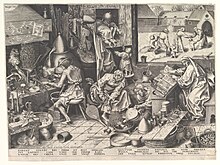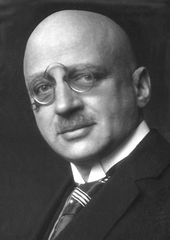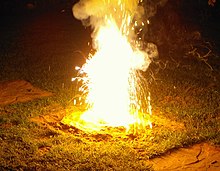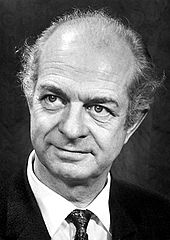chemistry
Chemistry ([ çeˈmi: ]; central and northern German also [ ʃeˈmi: ]; southern German: [ keˈmi: ]) is the natural science that deals with the structure, properties and transformation of chemical substances . A substance consists of atoms , molecules or both. It can also contain ions . The chemical reactions are processes in the electron shells of atoms, molecules and ions.
Central terms in chemistry are chemical reactions and chemical bonds . Chemical reactions form or break chemical bonds. This changes the probability of the electrons being located in the electron shells of the substances involved, and thus their properties. The production of substances ( synthesis ) with properties required by mankind is the central concern of chemistry today.
Chemistry is traditionally divided into sub-areas. The most important of these are organic chemistry , which studies carbon-containing compounds, inorganic chemistry , which deals with all the elements of the periodic table and their compounds, and physical chemistry , which deals with the fundamental phenomena that underlie chemistry.
Chemistry in its current form as an exact natural science gradually emerged in the 17th and 18th centuries from the application of rational reasoning based on observations and experiments of alchemy . Some of the first great chemists were Robert Boyle , Humphry Davy , Jöns Jakob Berzelius , Joseph Louis Gay-Lussac , Joseph Louis Proust , Marie and Antoine Lavoisier, and Justus von Liebig .
The chemical industry is one of the most important branches of industry. It produces substances that are required for the production of everyday objects (e.g. basic chemicals , plastics , paints ), food (also as auxiliary agents such as fertilizers and pesticides ) or to improve health (e.g. pharmaceuticals ).
Word origin

The name chemistry originated from ancient Greek χημεία chēmeía "[art of metal] foundry" in the sense of "conversion". The current spelling chemistry was probably first introduced by Johann Joachim Lange in the years 1750–1753 and at the beginning of the 19th century replaced the word chymy , which had existed since the 17th century , which is probably a simplification and reinterpretation of the expression alchemy , which has been documented since the 13th century “The art of gold production”, which itself has an ambiguous etymology (for the connotations compare the etymology of the word alchemy : the word is probably rooted in Arabic al-kīmiyá , which can mean “ philosopher's stone ” among other things , possibly from ancient Greek χυμεία chymeía "casting" or from Coptic / ancient Egyptian kemi "black [e earth]", compare also Kemet ).
Until the beginning of the 19th century, the terms "Scheidekunde" and "Scheidekunst" were considered alternatives to the word chemistry.
history

The chemistry in the ancient world was in the accumulated practical knowledge of materials conversion processes and the natural philosophical views of antiquity. The chemistry in the Middle Ages evolved from alchemy which has been practiced in China, Europe and India for thousands of years.
The alchemists dealt both with the hoped-for refinement of the metals (production of gold from base metals, see also transmutation ) and with the search for medicines. In particular, for the production of gold alchemists searched for Elixir (Philosophers stone 's Stone ), which was to convert the base ( "sick") metals in fine ( 'healthy') metals. In the medical branch of alchemy, an elixir was also searched for, the elixir of life, a cure for all diseases, which should ultimately also confer immortality. However, no alchemist has ever discovered the philosopher's stone or the elixir of life.
Up to the end of the 16th century, the world of ideas of the alchemists was generally not based on scientific research, but on facts of experience and empirical recipes. Alchemists conducted a wide variety of experiments on many substances in order to achieve their goals. They made notes of their discoveries and used the same symbols for their notes as were common in astrology . The mysterious nature of their work and the colored flames , smoke or explosions that often arise in the process led to them being known as magicians and sorcerers and sometimes persecuted. For their experiments, the alchemists developed some devices that are still used today in chemical process engineering .
A well-known alchemist was Albertus Magnus . As a cleric, he dealt with this complex of topics and found a new chemical element , arsenic , in his experiments . Only with the work of Paracelsus and Robert Boyle ( The Skeptical Chymist , 1661) did alchemy change from a purely Aristotelian science to a more empirical and experimental science that became the basis of modern chemistry.
The chemistry in modern times became the science decisive impetus in the 18th and 19th centuries: it was on the basis of measurement processes and experiments made, v. a. through the use of the scales , as well as the provability of hypotheses and theories about substances and the transformation of substances.
The work of Justus von Liebig on the effect of fertilizer founded the agrochemicals and provided important insights into the Inorganic Chemistry . The search for a synthetic substitute for the dye indigo for dyeing textiles was the trigger for the groundbreaking developments in organic chemistry and pharmacy . Up until the beginning of the 20th century, Germany had absolute priority in both areas. This lead in knowledge made it possible, for example, to extract the explosives required to wage the First World War with the help of catalysis from the nitrogen in the air instead of from imported nitrates (see Haber-Bosch process ).
The self-sufficiency efforts of the National Socialists gave chemistry as a science further impulses. In order to become independent of the import of crude oil , processes for the liquefaction of hard coal were further developed ( Fischer-Tropsch synthesis ). Another example was the development of synthetic rubber for the production of vehicle tires .
In today's world chemistry has become an important part of the culture of life . Chemical products surround us everywhere without our being aware of it. However, accidents in large- scale chemical industry, such as those of Seveso and Bhopal, gave chemistry a very negative image , so that slogans such as “ Get away from chemistry!” Could become very popular.
The research developed so far around the turn of the 20th century that in-depth studies of atomic structure no longer belonged to the field of chemistry, but to atomic physics and nuclear physics . Nevertheless, these researches provided important insights into the nature of chemical metabolism and chemical bonding. Other important impulses came from discoveries in quantum physics ( electron orbital model ).
General
Chemistry deals with the properties of elements and compounds, with the possible transformations of one substance into another, makes predictions about the properties for previously unknown compounds, provides methods for the synthesis of new compounds and measurement methods to decipher the chemical composition of unknown samples.
Although all substances are made up of comparatively few “building block types ”, namely from around 80 to 100 of the 118 known elements , the different combinations and arrangements of the elements lead to a few million very different compounds, which in turn have such different forms of matter as water, sand, plant and build up animal tissue or plastic. The type of composition ultimately determines the chemical and physical properties of the substances and thus makes chemistry a comprehensive science. In addition to school knowledge, those interested in chemistry and students in particular can deepen their knowledge through the chemical literature .
Advances in the various sub-areas of chemistry are often the indispensable prerequisite for new knowledge in other disciplines, especially in the fields of biology and medicine , but also in the field of physics and engineering . In addition, they often make it possible to reduce the production costs for many industrial products. For example, improved catalysts lead to faster reactions and thereby save time and energy in industry. Newly discovered reactions or substances can replace old ones and are therefore also of interest in science and industry.
- For medicine, chemistry is indispensable in the search for new drugs and in the manufacture of drugs .
- The engineering sciences often look for tailor-made materials depending on the application (lightweight materials for aircraft construction, durable and resilient building materials, high-purity semiconductors ...). Their synthesis is one of the tasks of chemistry.
- In physics, for example, highly pure substances are often required to carry out experiments, the production of which requires special synthesis methods.
Economic importance of chemistry

The chemical industry is - especially in Germany - a very important branch of the economy : In Germany, the turnover of the 20 highest-turnover German chemical companies in 2017 was over 250 billion euros, the number of employees after the reunification of Germany was over 700,000 and in 2017 it was over 900,000 grew. On the one hand, it produces basic chemicals such as sulfuric acid or ammonia , often in quantities of millions of tons per year, which it then uses, for example, to produce fertilizers and plastics . On the other hand, the chemical industry produces many complex substances, including pharmaceutical agents ( drugs ) and pesticides ( pesticides ), tailored for specific applications. The manufacture of computers , fuels and lubricants for the automotive industry and many other technical products is also impossible without industrially manufactured chemicals.
Chemistry in everyday life
Chemical reactions in everyday life take place, for example, when cooking , baking or roasting , and it is often the very complex metabolic transformations that take place here that contribute to the typical aroma of the food. Food is chemically broken down into its components during the body's own breakdown processes and also converted into energy. A chemical reaction that can be easily observed is combustion .
Hair coloring, combustion engines, mobile phone displays, detergents , fertilizers, pharmaceuticals, etc. v. m. are further examples of applications of chemistry in everyday life.
In everyday life, the term “chemistry” is often used in a restricted sense as an abbreviation for “product of the chemical industry”, for example in dry cleaning : This cleans textiles with (synthetic) solvents . The cleaning process itself is usually a dissolving of the contamination (for example a grease stain) in the solvent and therefore not a chemical process (substance conversion) in the actual sense, but a physical process (dissolving). In contrast to this, the dissolving of lime stains with vinegar or lemon juice, sometimes praised as “cleaning without chemicals”, is a chemical process, since solid calcium carbonate (lime) is converted into soluble calcium salts by the acids and hydrogen carbonate or carbon dioxide is converted.
education
School lessons

It is the task of chemistry lessons to provide insight into the material composition, groups of substances and material processes in nature. Conversions of matter in animate and inanimate nature are also based on chemical reactions and should be recognized as such. Likewise, the imparting of scientific knowledge should help build an understanding of modern technology and a positive attitude towards it, as chemistry in particular has made a significant contribution to improving people's living conditions through the introduction of new products. Last but not least, chemistry lessons also serve to educate students to become responsible consumers. For this reason, it is designed according to curricula and pedagogical concepts (chemistry didactics).
job
It is possible to be trained as a chemical laboratory assistant in a company and vocational school in the so-called dual system. Another apprenticeship for work in the chemistry laboratory is the chemical technical assistant (CTA). The Chemical (including chemical and pharmaceutical technologist or earlier chemical technician) is a professional training for employees in the chemical industry.
Many universities offer a degree in chemistry . The majority of chemists do a doctorate after completing their studies .
Look at
Chemistry has a relatively bad reputation among the German public. The sometimes incomprehensible formula for chemical compounds and reaction equations, and the reporting with a focus on chemical disasters and environmental scandals , may have led to a negative connotation, even if this does not seem to be justified in view of the usefulness and general importance of chemistry. In Europe in particular, the strict legislation ( Chemicals Act , Hazardous Substances Ordinance ) guarantees largely safe handling of chemicals . In order to improve the image of chemistry, the year 2003 was declared the " Year of Chemistry " by various sponsoring organizations . 2011 was declared the "International Year of Chemistry" by the UN (in cooperation with UNESCO and IUPAC ).
Famous chemists
- Important chemists (chronological) (sorted by date of birth)
- Eminent chemists (alphabetical)
- Eminent chemists (categories) (sorted according to the subject areas, there alphabetically)
- List of Nobel Prize Winners in Chemistry
Subjects
Chemistry is traditionally divided into organic and inorganic chemistry, with physical chemistry added around 1890 .
Since Friedrich Wöhler's urea synthesis in 1828 , in which the organic substance urea was produced from the inorganic compound ammonium cyanate , the boundaries between substances from inanimate (the "inorganic" substances) and living nature (the organic substances) have blurred. Living beings also produce a large number of inorganic substances, while almost all organic substances can be produced in the laboratory.
The traditional, but also arbitrary, distinction between inorganic and organic chemistry was retained. One reason is that organic chemistry is largely determined by the molecule , but inorganic chemistry is often determined by ions , crystals , complex compounds and colloids . Another is that the reaction mechanisms and substance structures in inorganic and organic matter differ in many ways.
Another possibility is to split the chemistry according to the objective into the investigative, 'decomposing' analytical chemistry and into the constructive, product-oriented preparative or synthetic chemistry. In the teaching practice at universities, analytical chemistry is often represented as a subject, while preparative chemistry is dealt with in the context of organic or inorganic chemistry.
There are other subject areas (such as forensic chemistry as a branch of applied chemistry).
General Chemistry
General chemistry is understood to be the basics of chemistry, which are important in almost all chemical sub-areas. It thus represents the conceptual foundation of all chemistry: the structure of the atom , the periodic table of the elements (PSE), the chemical bond , the basics of stoichiometry , acids , bases and salts and chemical reactions .
In contrast to other scientific disciplines, chemistry uses the term technicus “general chemistry” (there is no “general physics”). In this respect, general chemistry is at the beginning of every closer study of chemistry.
Inorganic chemistry

This direction, also known as inorganic chemistry, includes, to put it simply, the chemistry of all elements and compounds that do not exclusively contain carbon chains, because these are objects of organic chemistry. Inorganic chemistry deals, for example, with mineral acids , metals and other carbon-free compounds, but also with carbon dioxide , the acids hydrogen cyanide (hydrocyanic acid) and carbonic acid and their salts. Compounds that cannot be precisely classified fall into the field of organometallic chemistry . The bioinorganic chemistry overlaps thematically and more with the biochemistry.
Classical inorganic chemistry deals with small molecules or with salts or metals in general, so a sum formula is usually sufficient. In complex chemistry , where there are nonetheless isomers, systematic names and structural formulas are understandably required, as in organic chemistry. Often these are even based on those of similarly structured substances in organic chemistry (see, for example, silanes ). Modern inorganic chemistry is concerned with the structure formation ( structural chemistry ) of molecules and solids ( solid chemistry ), for example to create new materials with special physical and chemical properties or the complex behavior of particles in solutions ( colloid chemistry ).
Historical definition: Inorganic chemistry deals with the chemical elements and reactions of substances that are not produced by organic life (using the hypothetical life force ).
Organic chemistry
Organic chemistry (also organic) is the chemistry of the element carbon and only a few other elements, yet it has the greatest variety of chemical compounds. Due to the large number of structural elements, the chemistry of the hydrocarbons alone contains a huge number of different substances that differ only in different types of bonds, arrangements ( isomerism ) or only in terms of structure ( stereochemistry ). In addition, foreign atoms are often built into the hydrocarbon structure. Sum formulas are no longer sufficient to properly identify this myriad of compounds. For this reason, there is the IUPAC - nomenclature , assign a unique, systematic name which every substance (including any inorganic), although just for organic substances often trivial names (usual names; eg .: acetic acid.) Are available. Organic chemistry therefore divides its compounds into functional groups with similar chemical properties and is taught using comparable reaction mechanisms .
Historical definition : It used to be thought that organic substances, as the word "organic" already says, can only be produced by living things. This was attributed to a so-called “vis vitalis”, ie a “life force” that was hidden in these substances. This theory was unchallenged for a long time until Friedrich Wöhler succeeded in 1828 in converting an inorganic substance into an organic one in the laboratory for the first time. Wöhler's famous urea synthesis from ammonium cyanate by heating to 60 ° C.
The structure elucidation and synthesis of natural substances is part of natural product chemistry . Nowadays, the petroleum processing sector ( petrochemicals ) is of economic importance, as it provides starting materials for numerous large-scale synthesis.
Physical chemistry
Physical chemistry is the boundary between physics and chemistry. While in preparative chemistry (organic, inorganic) the question is, for example: "How can I create a substance?", Physical chemistry answers more quantitative questions, for example "Under which conditions does a reaction take place?" ( Thermodynamics ), “How fast is the reaction?” ( Kinetics ). It also provides the basis for analytical processes ( spectroscopy ) or technical applications ( electrochemistry , magnetochemistry and nanochemistry ). In overlap with meteorology also atmospheric chemistry .
Theoretical chemistry, quantum chemistry or molecular physics, which is gaining in importance, tries to fathom the properties of substances, chemical reactions and reaction mechanisms using physical models such as quantum mechanics or quantum electrodynamics and numerical calculations.
Physical chemistry was founded around 1890 mainly by Svante Arrhenius , Jacobus Henricus van 't Hoff and Wilhelm Ostwald . The latter was also the first editor of the journal for physical chemistry, founded together with van 't Hoff in 1887, and held the first German chair for physical chemistry in Leipzig .
The first independent institute for physical chemistry was founded in Göttingen in 1895 by Walther Nernst , who completed his habilitation at Ostwald . Other institutes specifically dedicated to physical chemistry followed in quick succession in Leipzig (1897), Dresden (1900), Karlsruhe (1903), Breslau, Berlin (1905) and elsewhere.
Chemists and physicists who work primarily in the field of physical chemistry are also known as physical chemists.
biochemistry
Biochemistry is the border discipline to biology and deals with the elucidation of metabolic processes, heredity at the molecular level ( genetics ) and the structure elucidation and synthesis ( molecular design ) of large biomolecules. The application of biochemistry in the technical field is called biotechnology . It overlaps with the related disciplines of pharmaceutical chemistry and medicinal chemistry .
Theoretical chemistry
Theoretical chemistry is the application of non-experimental (usually mathematical or computer simulation) methods to explain or predict chemical phenomena . Theoretical chemistry can be roughly divided into two directions: Some methods are based on quantum mechanics ( quantum chemistry ), others on statistical thermodynamics ( statistical mechanics ). Linus Carl Pauling , John Anthony Pople , Walter Kohn and John C. Slater made important contributions to theoretical chemistry and physical chemistry .
Preparative chemistry
This branch of chemistry is to a certain extent the opposite of analytical chemistry and deals with the synthesis of chemical compounds . The other sub-areas are essentially preparative, as one of the main tasks of chemistry is to synthesize compounds either on a small scale or in large quantities, as in the context of technical chemistry . In this respect, preparative chemistry is an essential part of chemist training. It also plays an important role in areas that intersect with chemistry, such as pharmaceutical chemistry or pharmaceutical technology .
Analytical chemistry
Analytical chemistry deals with the qualitative analysis ( which substances are contained?) And the quantitative analysis ( how much of the substance is contained?) Of substances. While classical analytical chemistry still required complex separation processes to isolate different substances and build up detection reactions in the test tube, nowadays these questions are dealt with in instrumental analysis with a high outlay on equipment.
Here, too, one subdivides into inorganic analytical chemistry and organic analytical chemistry . Numerous special fields have emerged here, for example clinical chemistry in overlap with medicine (compare laboratory medicine ) and toxicology or food chemistry . For some processes in microchemistry and trace analysis , only the smallest amounts of substance are required.
technical chemistry

Technical chemistry deals with the conversion of chemical reactions on a laboratory scale to large-scale industrial production. Chemical reactions from the laboratory cannot simply be transferred to large-scale industrial production. Technical chemistry therefore deals with the question of how many tons of the same product in a factory are created from a few grams of product in the laboratory.
To put it more abstractly: Technical chemistry looks for the optimal conditions for carrying out technically relevant reactions; this is done empirically or more and more through a mathematical optimization on the basis of a model description of the reaction process and the reactor.
- Preparation → reaction → preparation
Almost every production in the chemical industry can be divided into these three steps. First of all, the starting materials must be prepared. They may be heated, crushed, or compressed. The actual reaction takes place in the second step. In the last step, the reaction mixture is finally prepared. Chemical process engineering deals with preparation and processing. Chemical reaction engineering deals with reactions on an industrial scale .
Cosmochemistry
Cosmochemistry deals with chemical processes in space . Their subject matter is chemical substances and reactions that occur in interstellar space, on interstellar dust grains and on celestial bodies such as B. planets , comets , planetoids and moons can run.
Sources and further information
See also
literature
Lexicons
Non-fiction
- Dictionary of Chemistry: around 3500 terms from A to Z from all areas of chemistry ; with 56 tables, compiled and edited by Römpp-Lexikon-Red .: Barbara Frunder, Elisabeth Hillen and Ute Rohlf, Dt. Taschenbuch-Verlag, Munich 1995, ISBN 978-3-423-03360-2 .
- Charles E. Mortimer: Chemistry - The basic knowledge of chemistry . Thieme, Stuttgart 2003, ISBN 3-13-484308-0 .
- Joachim Kranz, Manfred Kuballa: Chemistry in everyday life. Cornelsen Scriptor, Berlin 2003, ISBN 3-589-21692-1 .
- Pedro Cintas: The Road to Chemical Names and Eponyms: Discovery, Priority, and Appreciation . In: Angewandte Chemie. 116 (44) (2004), pp. 6012-6018, doi: 10.1002 / anie.200330074 .
- Michael Wächter: Brief history (s) of the discovery of chemistry in the context of contemporary history and natural sciences , Verlag Königshausen und Neumann, Würzburg 2018, ISBN 978-3-8260-6510-1
Dictionaries
- Otto Dorrer: Pocket dictionary of the German and Italian language for the chemical industry , Verlag Milano: Libreria Editrice Politecnica Tamburini fu Camillo, Verlag Chemie, Berlin 1943, [1]
- Richard Ernst, Ingeborg Ernst von Morgenstern: Specialized dictionary of chemistry: Incl. Process engineering ud basics d. related sciences , Vol. 1 German - English 1961, Vol. 2. English-German, Brandstetter, Wiesbaden 1963, [2]
- Joachim Knepper, Beate Bürger, Frank Hering: Langenscheidt's specialist dictionary chemical analysis: English-German, German-English , published by the Technical University of Dresden, reprint of the 1st edition, Langenscheidt, Berlin; Munich; Vienna; Zurich; New York 2001, ISBN 978-3-86117-069-3
- Jean-François Le Marėchal, L. Souliė: Dictionnaire pratique de la chimie , Hatier, Paris; Forna, Renens 1992, ISBN 978-2-218-05607-9
Translation aids
- Robert Schoenfeld: The Chemist's English , 2nd revised edition, VCH Verlagsgesellschaft mbH. Weinheim 1986, ISBN 3-527-26597-X
Data collections
- Karl-Heinz Lautenschläger, Wolfgang Weber: Taschenbuch der Chemie , Verlag Europa-Lehrmittel Nourney, Vollmer GmbH & Co., 22nd edition, completely revised edition, 2018, ISBN 978-3-8085-5763-1
- Wächter, Michael: Book of tables of chemistry. Data on analysis, laboratory practice and theory , Wiley-VCH, Weinheim 2012, 1st edition, ISBN 978-3-527-32960-1
- Aylward, Gordon H., Findlay Tristan JV: data collection chemistry in SI units , 3rd exp. and edit again Ed., Verlag Chemie, Weinheim 1999, ISBN 978-3-527-29468-8
Chemistry journals that are easy to understand
Chemical journals (selection)
- Accounts of Chemical Research ISSN 0001-4842
- Angewandte Chemie (journal) ISSN 0044-8249
- Chemical Reviews ISSN 0009-2665
- Journal of Chromatography A , ISSN 0021-9673
- Journal of Chromatography B , ISSN 1570-0232
- Journal of the American Chemical Society (Engl.) ISSN 0002-7863
Organizations
- American Chemical Society
- German Bunsen Society for Physical Chemistry
- Society of German Chemists
- International Union of Pure and Applied Chemistry (IUPAC)
- Royal Society of Chemistry
- Société Francaise de Chimie
Web links
- Link catalog on chemistry at curlie.org (formerly DMOZ )
- gsbl.de: Joint federal / state substance data pool
Individual evidence
- ↑ Hans Schimank: “The chemist through the ages”, Verlag Chemie, Weinheim 1972, p. 214.
- ↑ Kluge Etymological Dictionary of the German Language, 24th edition, ISBN 3-11-017473-1
- ↑ Divorce. Duden , accessed on February 3, 2014 .
- ↑ The art of cutting. Duden , accessed on February 3, 2014 .
- ↑ Crusius (1788): Introduction to the general art of cutting, p. 313.
- ↑ a b The German chemical companies with the highest turnover - Association of the Chemical Industry eV (VCI). Accessed November 8, 2018 (German).
- ↑ Guido Kickelbick: Chemistry for Engineers. Pearson Germany 2008, ISBN 978-3-8273-7267-3 , p. 19.
- ↑ German UNESCO Commission e. V .: International Year of Chemistry 2011 .
- ^ Hochschule Fresenius: Applied Chemistry (B.Sc.) - focus on forensics .










